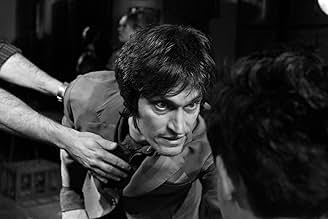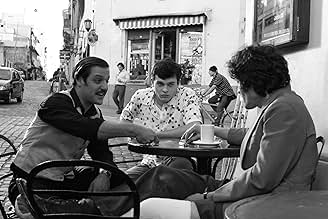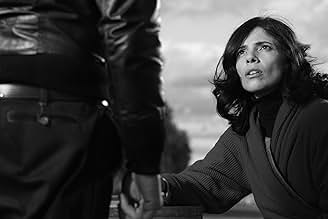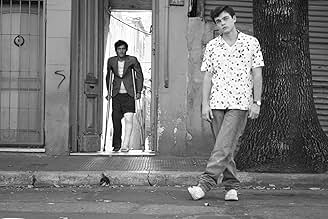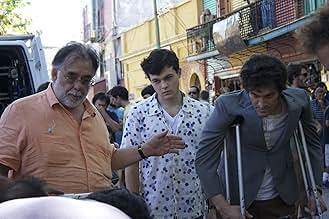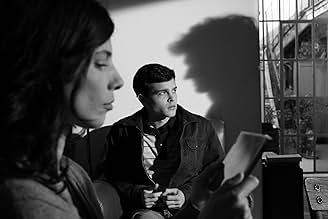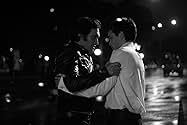Tetro
- 2009
- Tous publics
- 2h 7min
Bennie se rend à Buenos Aires pour retrouver son frère aîné disparu depuis longtemps, un écrivain autrefois prometteur qui n'est plus que l'ombre de lui-même. Il découvre la pièce inachevée ... Tout lireBennie se rend à Buenos Aires pour retrouver son frère aîné disparu depuis longtemps, un écrivain autrefois prometteur qui n'est plus que l'ombre de lui-même. Il découvre la pièce inachevée de son frère, et cela pourrait leur permettre de comprendre leur passé commun et de resser... Tout lireBennie se rend à Buenos Aires pour retrouver son frère aîné disparu depuis longtemps, un écrivain autrefois prometteur qui n'est plus que l'ombre de lui-même. Il découvre la pièce inachevée de son frère, et cela pourrait leur permettre de comprendre leur passé commun et de resserrer leur lien.
- Réalisation
- Scénario
- Casting principal
- Récompenses
- 1 victoire et 6 nominations au total
- José
- (as Rodrigo De La Serna)
- Ana
- (as Érica Rivas)
- María Luisa
- (as Sofía Castiglione)
Avis à la une
This an unsettling and interesting film , an intense drama concerning what past has Tetro left behind , being full of emotion , touching scenes , good feeling , marvellous dances inspired by The Hoffman Tales , The Red shoes by Michael Powell/ Emeric Pressburger and a final twist . It is a simple , dramatic and intelligent portrait of two people , focused on brothership , and sibling rivalry which a dark secret will forever change the family's fate . This is an uplifting movie at times , too , not just a tear-jerker or horrific in showing two sibling's suffering , as they attempt to regain the dignity they lost after years spent without seeing . The picture is developed in slow-moving but is pretty well realized . The flick stands out for its melancholy and poignant multilevel exploration of alienation , past records and despair . The story has a certain melancholic style , a climate of transience and sadness that spread the dispute between the two protagonists brothers . Visually it transports one into a dark, grey , nightmarish world but enriched by some colorful images thanks to some flasblacks well photographed by Mihai Malaimare Jr. , these images were shot in colour , but treated to give a slightly faded texture. The screenplay by Coppola himself , acting, direction all come together to create this extraordinary viewing experience . George Gallo gives a nice acting as the burnt-out Tetro , once-promising writer who is now a remnant of his former self , and he is is hot and cold toward his brother . His sibling is finely played by Alden Ehrenreich at his film debut as Bennie, a waiter on a cruise ship who has a layover in Buenos Aires to meet again his brother and subsequently he finds pages of Tetro's unfinished novel, then he pushes both to know his own history and to become a part of his life . Support cast is pretty good with several Argentina/Spain actors such as Maribel Verdú , Carmen Maura , Rodrigo De la Serna , Silvia Pérez , Erica Rivas , Leticia Brédice and special mention for Klaus Maria Brandauer as father .
The motion picture was compellingly directed by Francis Ford Coppola , though far from his greatest successes . Coppola explained that this one was a very "personal" project , being the kind of film he set out to make as a young man, before he was sidetracked by fame , fortune and sucessful boxoffice. Coppola's film The Godfather (1972) became one of the highest-grossing movies in history and brought him an Oscar for writing the screenplay with Mario Puzo The film was a Best Picture Academy Award-winner, and also brought Coppola a Best Director Oscar nomination. Following his work on the screenplay for The Great Gastby (1974), Coppola's next film was The conversation (1974), which was honored with the Golden Palm Award at the Cannes Film Festival, and brought Coppola Best Picture and Best Original Screenplay Oscar nominations. Also released that year, The Godfather: II (1974) , rivaled the big hit of The Godfather (1972) , and won six Academy Awards, bringing Coppola Academy Awards as a producer, director and writer. Coppola then began work on his most important film, Apocalypse Now (1979), a Vietnam War epic that was inspired by Joseph Conrad . Released in 1979, the acclaimed film won a Golden Palm Award at the Cannes Film Festival, and two Oscars. With George Lucas, Coppola executive produced Kagemusha (1980), directed by Akira Kurosawa, and Mishima (1985), directed by Paul Schrader and based on the life and writings of Yukio Mishima . Coppola also executive produced such films as The Escape Artist (1982) , Hammett (1983) , The Black Stallion Returns (1983), Barfly (1987), The Wind (1992) , The secret garden (1993), among others .
Tetro is, at its core, a film about family, in particular the relationship between brothers and their Father. A theme Francis Ford Coppola has immersed himself in before, most notably in The Godfather and Rumble Fish. Through a series of flashbacks we are given a glimpse of major events in Tetro's youth, his relationship with his father (played by Klaus Brandauer) and his subsequent departure. There are huge family secrets known only to Tetro and revealed to Bennie in an ending which echoes great literary and operatic works. Coppolas love of opera and theater is stamped all over the script and the city of Buenos Aires seems to be the perfect background in which to set this story.
Shot stunningly in digital monochrome with colour flashbacks, it has some aesthetic similarities to Rumble Fish. Coppola and cinematographer Mihai Malaimare Jr. reportedly site On The Waterfront and La Notte as big influences on the films visual style. There are certainly elements of both here, with the film also retaining its visual sense of self. It is operatic in both its narrative and its mise-en-scene. The idea of cutting between colour and monochrome as well as changing aspect ratios sounds as if it would be jarring, and it typically is. But for the purposes of Tetro it works perfectly.
Seen as a controversial choice by some, Vincent Gallo brings an edge to the titular character that some other actors may have lacked. However it is newcomer Alden Ehrenreich who steals the show as Bennie, a wayward teenager looking for guidance and approval. Maribel Verdu, as Miranda, provides the conduit between the two in a typicaly solid performance.
Hollywood is littered with once great directors who have fallen from grace, which makes Tetro all the more remarkable as a return to form from one of the greatest, Francis Ford Coppola.
It's a while since I last watched Rumble Fish but the brothers there were Mickey Rourke (a rare good film for him at that time) and Matt Dillon. It's about street gangs and pool halls and how an older brother can be very impressionistic on a younger sibling. I'll say no more, except it's a blinder of a film and better than this.
I would have to say that the monochrome cinematography here, though, that everybody drools over is just too dark and contrasty, for this subject and film. I'm a photographer, so hopefully know and whilst Rumble Fish looked superb, that was full of geometric angles and angular paradoxes. Here, the screen is often plunged into almost darkness much of the time.
There is a balletic beauty to much of it though and we veer away from Rumble Fish and on to his works of epic greatness. The Godfathers and Apocalypse Now all share with this, an operatic build up of artistic and emotional tension that is mesmerising. Tetro has this toward the end at the Festival and we start anticipating something big and great. Do we get it? You'll have to see it yourself...
Others have touched on the actual storyline and I'm going to leave that to them. That said, the cast are all good but oddly, Vincent Gallo, as Tetro seems to short-change us. Not performance wise but in that we just don't seem to get to know him, which is part of the whole story, of course. Clamming up into a shell is nature's way of protecting us, emotionally, which is what Tetro did - and still does.
One major plus to this, very bog-standard DVD, was the sound quality - I 'felt' the sound as much as heard it. It prickled my eardrums with a tactile clarity, certainly Hi-fi standard, plus. OK, it was through separate amp and speakers but is as all my TV watching is.
Is Tetro a film for you? That's a difficult one. Art-house cinema lovers probably will and those who like a drama that is quite complex also but those who want action and something akin to Apocalypse Now, no. It is long, visually rich and dark (like plain chocolate) and accordingly, not for everybody but for those who do, it holds many strengths.
Le saviez-vous
- AnecdotesFrancis Ford Coppola claimed that this is the kind of film he set out to make as a young man, before he was sidetracked by fame and fortune.
- GaffesEarly in the movie Tetro stumbles into the kitchen with a broken leg and knocks over some furniture while lighting a cigarette using a burner on the stove. he ignites the burner by just turning the knob on the stove. A few minutes later Miranda must use a match to light a burner on the same stove-top.
- ConnexionsFeatured in At the Movies: Cannes Film Festival 2009 (2009)
- Bandes originalesEl Búho
(2007) (uncredited)
Written & Performed by Lisandro Aristimuño
Courtesy of Los Años Luz Discos SRL
Meilleurs choix
- How long is Tetro?Alimenté par Alexa
Détails
- Date de sortie
- Pays d’origine
- Langues
- Aussi connu sous le nom de
- Francis Ford Coppola's Tetro
- Lieux de tournage
- Sociétés de production
- Voir plus de crédits d'entreprise sur IMDbPro
Box-office
- Budget
- 5 000 000 $US (estimé)
- Montant brut aux États-Unis et au Canada
- 518 522 $US
- Week-end de sortie aux États-Unis et au Canada
- 30 504 $US
- 14 juin 2009
- Montant brut mondial
- 2 874 474 $US
- Durée
- 2h 7min(127 min)
- Couleur
- Mixage
- Rapport de forme
- 2.35 : 1







